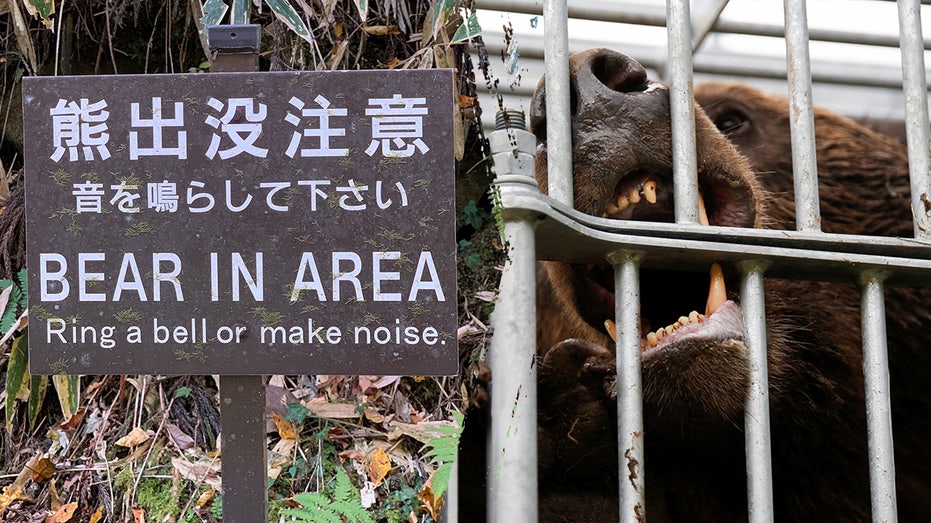Top Stories
Japan Deploys Military Amid Surge in Deadly Bear Attacks

UPDATE: Japan is facing an unprecedented crisis as regional authorities have officially requested military assistance following a record surge in bear attacks. With at least 12 people killed and over 100 injured this year alone, the situation has escalated to alarming levels, particularly in northern prefectures like Akita, Iwate, and Fukushima.
Officials have described this as Japan’s most severe wildlife crisis in decades. Bears have increasingly invaded populated areas, forcing lockdowns in rural towns and raising urgent fears among residents. Reports indicate that bears are now being spotted near homes, schools, and shopping districts, creating an atmosphere of dread.
On October 30, 2025, Akita Governor Norihisa Satake formally requested the deployment of the Self-Defense Forces (SDF) to assist local authorities overwhelmed by repeated bear maulings. The SDF’s role will focus on logistics—transporting carcasses, setting traps, and patrolling forested areas where bear sightings are frequent. Importantly, only licensed hunters will be authorized to shoot bears deemed a threat, as confirmed by defense officials.
The crisis is compounded by a diminishing hunter population in Japan, with approximately 60% of licensed hunters now over the age of 60. Many traditional bear trackers, known as matagi, have retired, leaving rural areas critically understaffed to respond to emergencies. To address this gap, local governments in Akita, Niigata, and Hokkaido are increasing incentives for new hunters, including subsidies, training stipends, and per-bear bounties.
Experts attribute the spike in bear encounters to a combination of factors: poor acorn and beech nut harvests, warmer winters delaying hibernation, and rural depopulation, which leaves farmland and buffer zones unmanaged. This surge in wildlife encounters has reignited a national debate about balancing wildlife conservation with public safety. Bears, once revered in Japanese folklore, now pose an immediate threat to communities.
Japan’s Environment Ministry has urged residents to protect their homes by avoiding forest edges, securing garbage and food waste, and promptly reporting bear sightings. Officials emphasize that this is a wildlife management crisis, not a war on bears, but for frightened residents, the threat feels dangerously real.
As the military begins its logistical operations, the situation remains fluid, and residents are urged to stay vigilant. The demand for effective solutions continues to grow, with public safety at the forefront of discussions. For those living in the affected areas, the looming presence of bears is a stark reminder of the delicate balance between humans and wildlife.
This developing story will be monitored closely as authorities work to contain the crisis and ensure the safety of residents in the affected regions.
-

 Science2 weeks ago
Science2 weeks agoResearchers Challenge 200-Year-Old Physics Principle with Atomic Engines
-

 Politics2 weeks ago
Politics2 weeks agoNHP Foundation Secures Land for 158 Affordable Apartments in Denver
-

 Lifestyle6 days ago
Lifestyle6 days agoTrump’s Push to Censor National Parks Faces Growing Backlash
-

 Health2 weeks ago
Health2 weeks agoNeuroscientist Advocates for Flag Football Until Age 14
-

 Lifestyle2 weeks ago
Lifestyle2 weeks agoLongtime Friends Face Heartbreak After Loss and Isolation
-

 World1 week ago
World1 week agoBoeing’s Aircraft Production: Assessing Numbers and Challenges
-

 Politics6 days ago
Politics6 days agoNFL Confirms Star-Studded Halftime Show for Super Bowl LVIII
-

 World2 weeks ago
World2 weeks agoGlobal Military Spending: Air Forces Ranked by Budget and Capability
-

 Top Stories1 week ago
Top Stories1 week agoUrgent Search for Suspect Who Exposed Himself to Teen Girl
-

 Science7 days ago
Science7 days agoAI Misidentifies Doritos Bag as Gun, Triggers Police Response
-

 Lifestyle1 week ago
Lifestyle1 week agoRed Bluff High School’s Elli Nolan Named Rotary Student of the Month
-

 Entertainment7 days ago
Entertainment7 days agoSyracuse Stage Delivers Lively Adaptation of ‘The 39 Steps’









